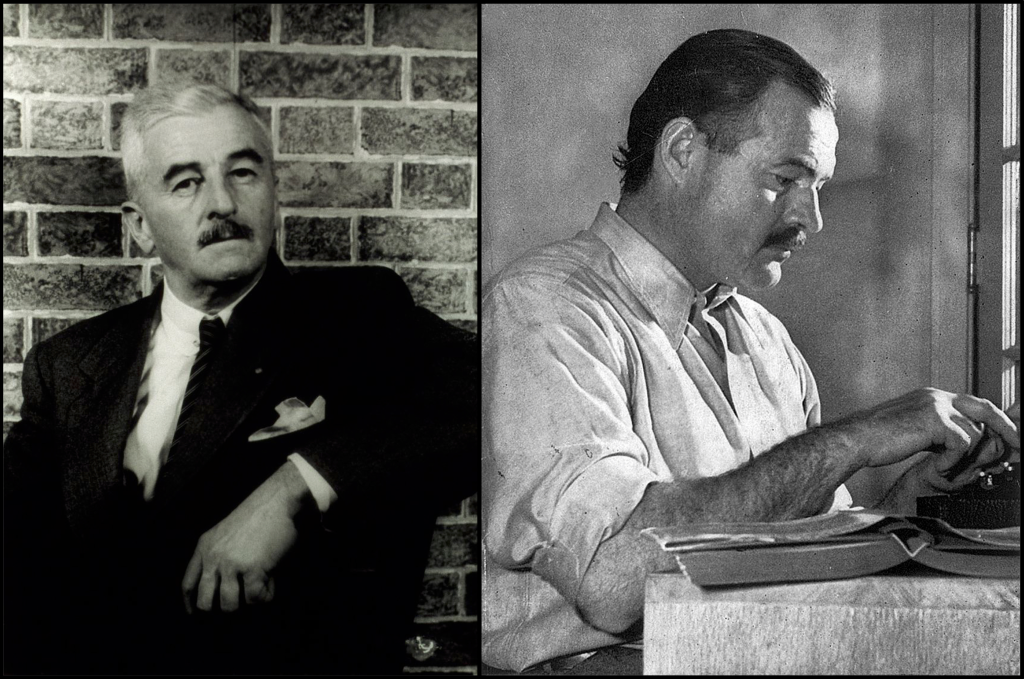

Images via Wikimedia Commons
Within the mid-Twentieth century, the 2 massive canine within the American literary scene had been William Faulkner and Ernest Hemingway. Each had been internationally revered, each had been masters of the novel and the brief story, and each gained Nobel Prizes.
Born in Mississippi, Faulkner wrote allegorical histories of the South in a method that’s each elliptical and challenging. His works had been marked by makes use of of stream-of-consciousness and shifting factors of view. He additionally favored titanically long sentences, maintaining the file for having, according to the Guinness E book of Data, the longest sentence in literature. Open your copy of Absalom! Absalom! to chapter 6 and you’ll find it. Hemingmanner, on the other hand, well-knownly sandblasted the florid prose of Victorian-era books into brief, terse, deceptively simple sentences. His stories had been about rootmuch less, damaged, cosmopolitan people in exotic locations like Paris or the Serengeti.
In case you sort in “Faulkner and Hemingmanner” in your favourite search engine, you’ll likely stumble upon this well-known trade — Faulkner on Hemingmanner: “He has never been recognized to make use of a phrase which may ship a learner to the dictionary.” Hemingmanner: “Poor Faulkner. Does he actually suppose massive emotions come from massive phrases?” Zing! Faulkner reportedly didn’t imply for the road to come back off as an insult however Hemingmanner took it as one. The incident finished up being essentially the most acrimonious within the two authors’ complicated relationship.
Whereas Faulkner and Hemingmanner never formally met, they had been regular correspondents, and every was eagerly conscious of the different’s talents. And so they had been competitive with every other, especially Hemingmanner who was rather more inseremedy than you would possibly surmise from his macho persona. Whereas Hemingmanner regularly known as Faulkner “the very best of us all,” marveling at his natural abilities, he additionally hammered Faulkner for resorting to methods. As he wrote to Harvey Breit, the famed critic for The New York Occasions, “If it’s a must to write the longest sentence on this planet to provide a guide distinction, the following factor it is best to rent Bill Veek [sic] and use midgets.”
Faulkner, on his finish, was no much less competitive. He as soon as advised the New York Herald Tribune, “I feel he’s the very best we’ve bought.” On the other hand, he bristled when an editor malestioned getting Hemingsolution to write the preface for The Moveable Faulkner in 1946. “It appears to me in dangerous style to ask him to write down a preface to my stuff. It’s like asking one race horse within the middle of a race to broadforged a blurb on another horse in the identical running area.”
When Breit requested Faulkner to write down a overview of Hemingway’s 1952 novella The Old Man and the Sea, he refused. But when a couple months later he bought the identical request from Washington and Lee College’s literary journal, Shenandoah, Faulkner relented, giving guarded reward to the novel in a one-paragraph-long overview. You’ll be able to learn it under.
His finest. Time might present it to be the very best single piece of any of us, I imply his and my contemporaries. This time, he discovered God, a Creator. Till now, his women and men had made themselves, formed themselves out of their very own clay; their victories and defeats had been by the hands of every other, simply to show to themselves or one another how robust they could possibly be. However this time, he wrote about pity: about somefactor somethe place that made all of them: the outdated man who needed to catch the fish after which lose it, the fish that needed to be caught after which misplaced, the sharks which needed to rob the outdated man of his fish; made all of them and beloved all of them and pitied all of them. It’s all proper. Reward God that whatever made and loves and pities Hemingmanner and me saved him from contacting it any further.
And you may as well watch under a fascinating speak by scholar Joseph Fruscione about how Faulkner and Hemingmanner competed and influenced every other. He wrote the guide, Faulkner and Hemingway: Biography of a Literary Rivalry.
Word: An earlier version of this submit appeared on our web site in 2014.
Related Content:
The Art of William Faulkner: Drawings from 1916–1925
Ernest Hemingway Creates a Reading List for a Young Writer, 1934
‘Never Be Afraid’: William Faulkner’s Speech to His Daughter’s Graduating Class in 1951
Seven Tips From William Faulkner on How to Write Fiction
Rare 1952 Film: William Faulkner on His Native Soil in Oxford, Mississippi
Jonathan Crow is a author and moviemaker whose work has appeared in Yahoo!, The Hollywooden Reporter, and other publications.